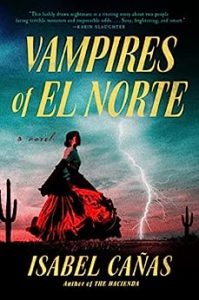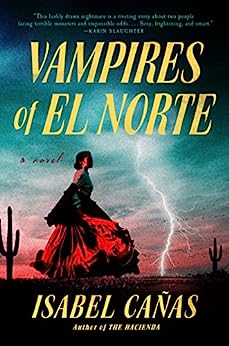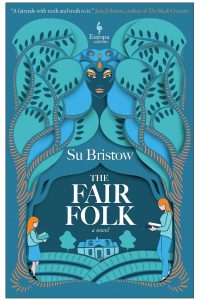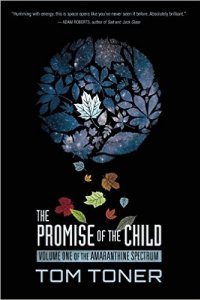Alex Brown Reviews Vampires of El Norte by Isabel Cañas
 Vampires of El Norte, Isabel Cañas (Berkeley 978-0-59343-672-1, $28.99, 400pp, hc) August 2023.
Vampires of El Norte, Isabel Cañas (Berkeley 978-0-59343-672-1, $28.99, 400pp, hc) August 2023.
I like historical fantasy as a subgenre, but I especially love historical fantasy set in the American West with BIPOC protagonists encountering the horrors of colonialism and the supernatural in equal measure. Victor LaValle’s viciously impressive Lone Women is one of the best of the bunch of the last several years, but Isabel Cañas’ Vampires of El Norte is giving it a run for its money.
Set in the baking heat of the Texas-Mexico border in the 1840s, Vampires of El Norte is about two young adults in their early twenties trying to survive an oncoming war. Although the Mexican-American War didn’t officially begin until April, skirmishes in Texas had been going on for a while, especially since the annexation of Texas a year prior. The bulk of the story takes place in February 1846, but the story opens nine years earlier. The two kids, just thirteen, sneak out of their homes late at night on the hunt for buried treasure. Instead, they encounter their first vampire. The terrifying event nearly kills Nena, the beautiful daughter of a wealthy rancho owner, and drives Néstor, the son of a poor péon working on the rancho, out on his own. Years later when the Rinches, the Mexican term for Texas Rangers, make moves on a nearby region, Nena and Néstor are reunited. Each has longed for the other, but the social hierarchy, the patriarchy, and their own stubbornness hold them back.
Néstor and Nena circle each other, not knowing whether to fight or kiss, but something else is circling them. A mysterious sleeping disease known as susto is afflicting Mexican men, and is paired with a vicious bite wound… much like the one Nena received all those years ago. Soon, the two realize the monster that attacked them was no hallucination but a real vampire. On the run for their lives with death stalking them across the Texas plains, their love for each other may not be enough to keep each other alive.
The title and cover copy make this novel sound more like a blend of historical fantasy and horror, when in reality it’s a historical fantasy romance with a splash of horror. The vampires drive the action, but the bulk of the narrative revolves around the fraught romance between Néstor and Nena. Avid romance readers will recognize many genre tropes and spot the ending coming from a mile away. Structurally, I would have preferred a little less romance and a little more horror. In the Author’s Note, Cañas mentions that the story came together when she read a quote from Mexican folk hero, rancher, and militiaman Juan Cortina: ‘‘Flocks of vampires, in the guise of men, came and scattered themselves in the settlements. Many of you have been robbed of your property, incarcerated, chased, murdered, and hunted like wild beasts, because your labor was fruitful, and because your industry excited the wild avarice which led them.’’ With the romance taking such a central role, the vampire metaphor-made-real doesn’t get the impact Cañas was probably going for.
The only thing I felt was missing here were Indigenous people. Néstor and Nena repeatedly talk about how the land is theirs and how long their family has been living on it… with no acknowledgement or understanding that what they’re experiencing isn’t far off from what the first people of Texas went through with early Spanish settlers. I know these two characters wouldn’t think of colonialism in the same way we do, and in no way am I diminishing their claim to the land. I also know almost nothing about the history of this portion of Mexican ter ritory – my Mexican American War knowledge is limited to events in California – but I have to assume there were at least some Native people near Los Ojuelos. Yet ‘‘Indios’’ are barely mentioned and only in passing. Even while Nena and Néstor are on the run from the Rinches and when the vampires are slaughtering their way across the wilderness, we never encounter any Indigenous people, settlements, or evidence of past lives.
I’m unsure how fictionalized the book version of Los Ojuelos is, but history from the 1830s and 1840s features Indigenous resistance to Spanish and Mexican colonization. It matters very little to me how accurate historical fantasy actually is, but when your premise centers on the theft of land from families with generational ties by greedy, violent outsiders, it seems there should be at least some Native representation.
That said, Isabel Cañas does a solid job of blending genres. I loved how she balanced the worldbuilding by giving the reader just enough to understand the story but not enough to explain the whys and hows. The reader only knows as much as the protagonists, and that lack of knowledge keeps the tension high and the energy frantic. The heat between the two protagonists practically leaps off the page, and the descriptions are frighteningly vivid. Go in ready for a sweeping love story between two star-crossed lovers in a dark fantasy setting, and you’ll have a great time. Vampires of El Norte is a thrilling end-of-summer ride.
Alex Brown is a librarian, author, historian, and Hugo-nominated and Ignyte award-winning critic who writes about speculative fiction, young adult fiction, librarianship, and Black history.
This review and more like it in the August 2023 issue of Locus.
 While you are here, please take a moment to support Locus with a one-time or recurring donation. We rely on reader donations to keep the magazine and site going, and would like to keep the site paywall free, but WE NEED YOUR FINANCIAL SUPPORT to continue quality coverage of the science fiction and fantasy field.
While you are here, please take a moment to support Locus with a one-time or recurring donation. We rely on reader donations to keep the magazine and site going, and would like to keep the site paywall free, but WE NEED YOUR FINANCIAL SUPPORT to continue quality coverage of the science fiction and fantasy field.
©Locus Magazine. Copyrighted material may not be republished without permission of LSFF.








